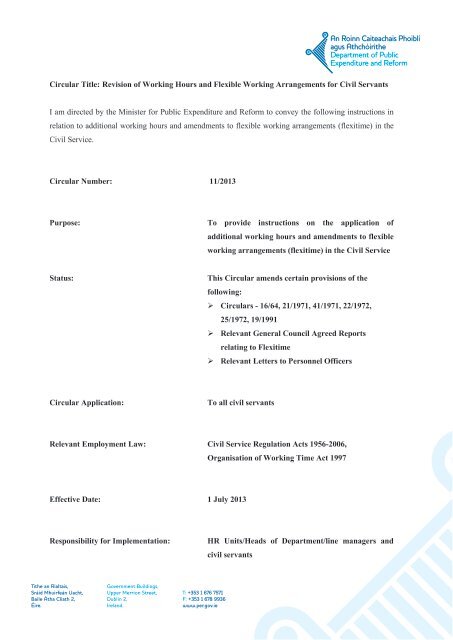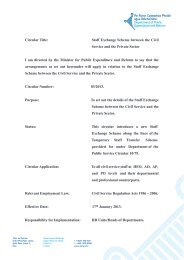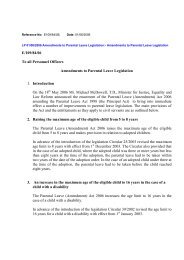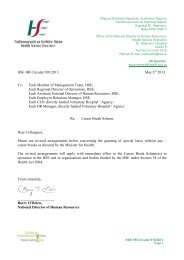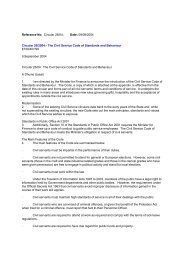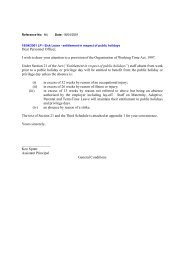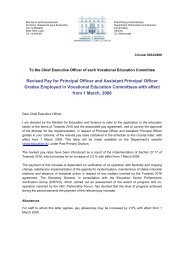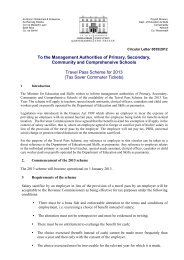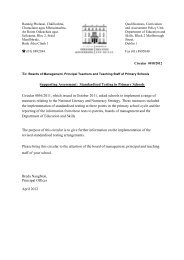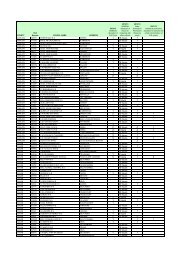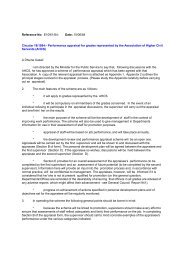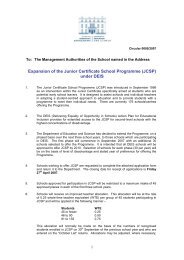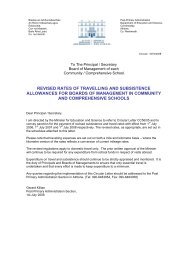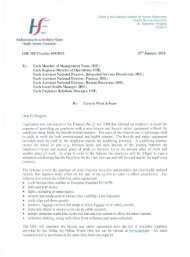Revision of Working Hours and Flexible Working ... - Circulars
Revision of Working Hours and Flexible Working ... - Circulars
Revision of Working Hours and Flexible Working ... - Circulars
You also want an ePaper? Increase the reach of your titles
YUMPU automatically turns print PDFs into web optimized ePapers that Google loves.
Circular Title: <strong>Revision</strong> <strong>of</strong> <strong>Working</strong> <strong>Hours</strong> <strong>and</strong> <strong>Flexible</strong> <strong>Working</strong> Arrangements for Civil ServantsI am directed by the Minister for Public Expenditure <strong>and</strong> Reform to convey the following instructions inrelation to additional working hours <strong>and</strong> amendments to flexible working arrangements (flexitime) in theCivil Service.Circular Number: 11/2013Purpose:To provide instructions on the application <strong>of</strong>additional working hours <strong>and</strong> amendments to flexibleworking arrangements (flexitime) in the Civil ServiceStatus:This Circular amends certain provisions <strong>of</strong> thefollowing:‣ <strong>Circulars</strong> - 16/64, 21/1971, 41/1971, 22/1972,25/1972, 19/1991‣ Relevant General Council Agreed Reportsrelating to Flexitime‣ Relevant Letters to Personnel OfficersCircular Application:To all civil servantsRelevant Employment Law: Civil Service Regulation Acts 1956-2006,Organisation <strong>of</strong> <strong>Working</strong> Time Act 1997Effective Date: 1 July 2013Responsibility for Implementation:HR Units/Heads <strong>of</strong> Department/line managers <strong>and</strong>civil servants
INTRODUCTION1. I am directed by the Minister for Public Expenditure <strong>and</strong> Reform to convey the followinginstructions in relation to:(a) Additional working hours(b) Changes to flexible working arrangements (flexitime).2. The provisions in this Circular apply to all civil servants. However, paragraphs 4, 8, 14, 15,16, 24 <strong>and</strong> 25 will apply only to civil servants in grades covered by a collective agreementregistered with the Labour Relations Commission.ADDITIONAL WORKING HOURS3. The st<strong>and</strong>ard working hours <strong>of</strong> civil servants will increase as follows:‣ Those with a working week <strong>of</strong> 35 hours or less (net <strong>of</strong> rest breaks) will increase to aminimum <strong>of</strong> a 37 hour week‣ Those with a working week that is greater than 35 hours but less than 39 hours (net <strong>of</strong> restbreaks) will increase to a 39 hour week‣ <strong>Working</strong> hours <strong>of</strong> those currently with a net working week <strong>of</strong> 39 hours or greater willremain the same.4. The implementation <strong>of</strong> additional hours will be on the basis <strong>of</strong> the following phasedarrangement:‣ The first 2 hours <strong>and</strong> 15 minutes will be implemented from 1 July 2013‣ Any remaining liability will be implemented from 1 July 2015.Normal attendance period5. The normal attendance period for civil servants will be from 9.00am to 5.45pm Monday toThursday, <strong>and</strong> 9.00am to 5.15pm on Friday with 1 hour <strong>and</strong> 15 minutes for lunch break.6. The majority <strong>of</strong> civil servants will now be working 37 hours net per week. For those not on37 hours net per week, adjustments will need to be made to the above attendance period bylocal management.7. No additional annual leave entitlement will accrue with the additional working hours.Option to remain on current hours8. A civil servant may, with the agreement <strong>of</strong> management, opt on an individual basis to remainon their current hours with appropriate pay adjustments for a period. This period will end nolater than 30 June 2014 unless otherwise agreed with management. Reduced hours will betreated as a worksharing arrangement <strong>and</strong> will be subject to the rules governing theWorksharing Scheme.Accumulated hours9. Flexibility in the use <strong>of</strong> the extra hours may be required in the form <strong>of</strong> attendance outside <strong>of</strong>the normal attendance period in some areas. This may include the option, in some instanceswhere required for business needs, to accumulate additional hours so that staff in a particular2
area may work a reduced per week pattern over a period but owe the additional hours to beutilised to cope with peak work requirements in another period, including outside <strong>of</strong> normalattendance periods/days.10. Extra hours worked will be deployed <strong>and</strong> may be aggregated on a daily, weekly or annualbasis as best meets the organisation’s service dem<strong>and</strong>s.11. Saturday will not be a normal working day, in the context <strong>of</strong> accumulated hours, but it could,in certain circumstances, be utilised to cope with cases <strong>of</strong> peak work requirements, subject tothe consultation process outlined below. There are no circumstances in which a requirementto attend on Sunday will arise, other than in accordance with overtime or other arrangements.Accumulated hours – workplace consultation12. The introduction <strong>of</strong> accumulated hours will be the subject <strong>of</strong> detailed consultation atworkplace level. It is envisaged that it will be possible to identify the attendance patterns atthe start <strong>of</strong> the calendar year <strong>and</strong> that workplace consultations will commence at least eightweeks before any accumulated hours are utilised.13. This consultation will include discussion on the number <strong>of</strong> flexi periods designated for the use<strong>of</strong> accumulated hours <strong>and</strong> the maximum additional hourly requirement in any flexi period. Anorm <strong>of</strong> two consecutive designated flexi periods <strong>and</strong> <strong>of</strong> eight additional hours in a flexiperiod (where the st<strong>and</strong>ard week is 37 hours) will apply unless otherwise agreed.14. Agreement shall be reached in these consultations on the maximum hours to be accumulated<strong>and</strong> the period(s) over which they will be worked.15. If agreement on the use <strong>of</strong> the accumulated hours cannot be reached in any particular case, thebinding dispute resolution provisions <strong>of</strong> any relevant collective agreement will be utilised.Accumulated hours arrangements – pilot <strong>and</strong> review16. Any arrangements in relation to accumulated hours will be introduced on a pilot basis initially<strong>and</strong> reviewed after a period <strong>of</strong> six months in operation. This review will encompass theimpact <strong>of</strong> the arrangements on the work/life balance issues for the staff involved.FLEXIBLE WORKING ARRANGEMENTS (FLEXITIME)17. <strong>Flexible</strong> working arrangements (flexitime) in the civil service are now revised to take account<strong>of</strong> the additional working hours.18. Management has the responsibility <strong>and</strong> the right to actively manage flexible workingarrangements (flexitime) in their organisations to ensure that Departments/Offices can meettheir business needs across the full working day. Flexitime is only possible as long as itsupports <strong>and</strong> enhances the efficient operation <strong>of</strong> Departments/Offices. In particular, all areasmust always be appropriately staffed during the working day, including lunch breaks; allarrangements must ensure that this is consistently the case.19. The current flexitime system will be subject to the following amendments to net hours:3
‣ Daily hours will increase to 7 hours 24 minutes (from 6 hours 57 minutes)‣ Half day (morning) will increase to 3 hours 42 minutes (from 3 hours 30 minutes)‣ Half day (afternoon) will increase to 3 hours 42 minutes (from 3 hours 27 minutes)‣ Weekly hours will increase to 37 hours (from 34 hours 45 minutes)‣ Flexi period hours will increase to 148 hours (from 139 hours).20. Any necessary amendments to core time b<strong>and</strong>s to reflect the additional working hours <strong>and</strong> tomeet business needs will be subject to detailed consultation at workplace level.Changes to flexi leave21. With effect from 1 July 2014, the maximum amount <strong>of</strong> flexi leave allowed in any flexi periodis one day.22. There is no change to the existing number <strong>of</strong> hours that can be carried over.Grades affected23. Flexitime will only be available for staff up to Higher Executive Officer (HEO) grade <strong>and</strong> itsequivalents in the Civil Service, as appropriate.24. Assistant Principals (APs) <strong>and</strong> their equivalents in the Civil Service will not have access t<strong>of</strong>lexitime unless, on 30 June 2013, they already have access to this arrangement.25. APs <strong>and</strong> their equivalents that have access to flexitime on 30 June 2013 will retain it on apersonal basis for as long as they remain in the same grade <strong>and</strong> are employed in anorganisation that has access to flexitime for APs.IMPLEMENTATION26. HR Units should communicate this policy to all civil servants in their Department/Office. This policy is also available on www.circulars.gov.ie <strong>and</strong> will also be available onrequest from your HR Unit or the PeoplePoint Portal http://peoplepoint.gov.ie.27. Queries in relation to this Circular should be addressed to your HR Unit.Patricia ColemanDirector14 June 20134


